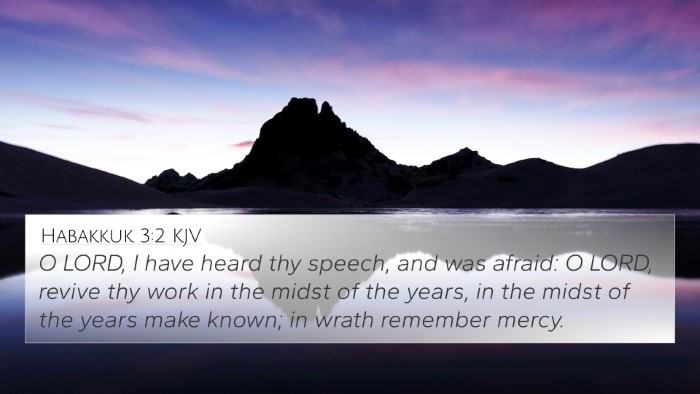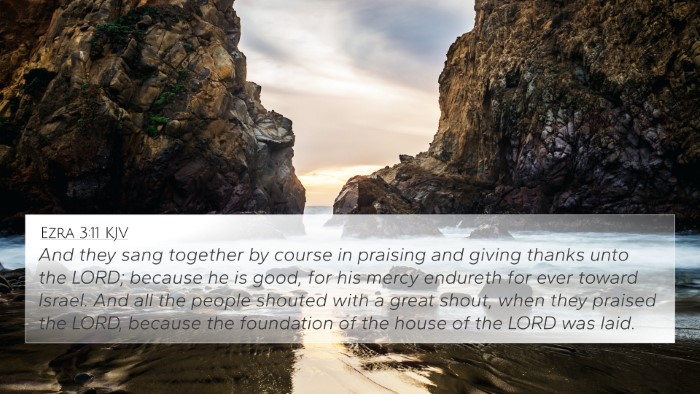Psalms 85:6 - Understanding and Interpretation
Bible Verse: Psalms 85:6
Verse: "Will you not revive us again, that your people may rejoice in you?"
Summary of Meaning
This verse is a heartfelt plea for spiritual rejuvenation. The psalmist is seeking God’s intervention to restore the joy and vitality of His people. The question reflects a deep desire for revival—both personal and communal—indicating that the people recognize their need for God's grace and intervention in their lives.
Insights from Commentaries
-
Matthew Henry:
Henry emphasizes the importance of recognizing our need for divine revival. The psalmist's plea is one that acknowledges human frailty and the ultimate dependence on God for restoration. This revival is not merely for personal benefit but aims to bring communal joy centered in God.
-
Albert Barnes:
Barnes points out that this request arises in the context of previous sufferings endured by the people of Israel. He interprets the verse as a call to remember God’s past mercies and to seek restoration. The joy mentioned is a reflection of a renewed relationship with God.
-
Adam Clarke:
Clarke interprets this verse as a universal cry for deliverance and revitalization. He comments that the revival sought is integral to experiencing true joy, which can only be found in the presence of God. This underscores the relationship between spiritual health and communal happiness.
Cross References
Psalms 85:6 shares thematic connections with several other Scripture passages:
- Psalms 143:11: "Quicken me, O Lord, for thy name’s sake: for thy righteousness' sake bring my soul out of trouble." - A similar plea for revival and life.
- Isaiah 57:15: "For thus says the High and Lofty One that inhabits eternity, whose name is Holy; I dwell in the high and holy place, with him also that is of a contrite and humble spirit, to revive the spirit of the humble, and to revive the heart of the contrite ones." - Emphasizing God's willingness to revive the humble.
- Habakkuk 3:2: "O Lord, I have heard your speech and was afraid; O Lord, revive your work in the midst of the years!" - A request for revival in the face of fear.
- Ezekiel 37:5: "Thus says the Lord God to these bones: 'Surely I will cause breath to enter you, and you shall live!'" - A metaphorical revival of dry bones illustrating God's power to restore life.
- John 10:10: "I have come that they may have life, and that they may have it more abundantly." - Jesus speaks to the revival of life and joy that comes through Him.
- Acts 3:19: "Repent therefore and be converted, that your sins may be blotted out, so that times of refreshing may come from the presence of the Lord." - Indicates a revival comes after repentance.
- Romans 6:4: "Therefore we were buried with Him through baptism into death, that just as Christ was raised from the dead by the glory of the Father, even so we also should walk in newness of life." - A new life through connection with Christ.
Thematic Connections
Exploring the connections between these verses reveals a consistent biblical theme of God's desire to restore, revive, and bring joy to His people:
- Recognition of Human Need: Just as Psalms 85:6 acknowledges the need for revival, other verses highlight our dependence on God.
- The Role of Repentance: Many of the referenced verses emphasize turning back to God as a condition for revival.
- Communal Joy: The call for collective restoration is echoed in verses that discuss the joy of the community in God's presence.
Conclusion
The plea in Psalms 85:6 encapsulates a vital aspect of the human relationship with God: the continual need for renewal and joy found in His presence. Awareness of our spiritual state enables us to seek His revival actively, resulting in transformative joy that impacts not only our lives but also the community of believers.
Additional Resources for Bible Study
- Utilizing a Bible concordance to explore themes of revival and joy across books of the Bible.
- Consulting a Bible cross-reference guide for deeper insights into connected verses.
- Engaging in cross-reference Bible study methods for a thorough understanding of inter-Biblical dialogue.
- Exploring comprehensive Bible cross-reference materials to bolster study and application of themes.
How to Study Cross-Referencing in the Bible
To effectively find connections between verses, consider these approaches:
- Using a bible reference resources to track thematic links.
- Studying Bible verses that relate to each other within various contexts.
- Practicing a detailed cross-reference between Gospels to see parallels in teachings.
- Identifying connections between Old and New Testament scriptures to gain a holistic view of biblical themes.














